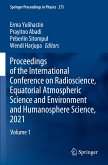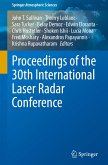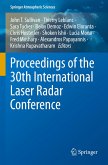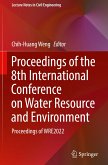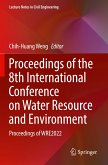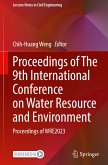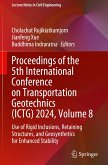Proceedings of the International Conference on Radioscience, Equatorial Atmospheric Science and Environment and Humanosphere Science, 2021
Herausgegeben:Yulihastin, Erma; Abadi, Prayitno; Sitompul, Peberlin; Harjupa, Wendi
Proceedings of the International Conference on Radioscience, Equatorial Atmospheric Science and Environment and Humanosphere Science, 2021
Herausgegeben:Yulihastin, Erma; Abadi, Prayitno; Sitompul, Peberlin; Harjupa, Wendi
- Gebundenes Buch
- Merkliste
- Auf die Merkliste
- Bewerten Bewerten
- Teilen
- Produkt teilen
- Produkterinnerung
- Produkterinnerung
This book presents recent advances in the area of Radioscience, Equatorial Atmospheric Science and Environment from the international symposium for equatorial atmosphere of the celebration of the Equatorial Atmosphere Radar (EAR) 20th Anniversary, conducted by Indonesian National Institute of Aeronautics and Space (LAPAN) and Kyoto University, in 2021. It provides a scientific platform for all participants to discuss ideas and current issues as well as to design solutions in the areas of atmospheric science, environmental science, space science, and related fields.
Andere Kunden interessierten sich auch für
![Proceedings of the International Conference on Radioscience, Equatorial Atmospheric Science and Environment and Humanosphere Science, 2021 Proceedings of the International Conference on Radioscience, Equatorial Atmospheric Science and Environment and Humanosphere Science, 2021]() Proceedings of the International Conference on Radioscience, Equatorial Atmospheric Science and Environment and Humanosphere Science, 2021126,99 €
Proceedings of the International Conference on Radioscience, Equatorial Atmospheric Science and Environment and Humanosphere Science, 2021126,99 €![Proceedings of the 30th International Laser Radar Conference Proceedings of the 30th International Laser Radar Conference]() Proceedings of the 30th International Laser Radar Conference186,99 €
Proceedings of the 30th International Laser Radar Conference186,99 €![Proceedings of the 30th International Laser Radar Conference Proceedings of the 30th International Laser Radar Conference]() Proceedings of the 30th International Laser Radar Conference194,99 €
Proceedings of the 30th International Laser Radar Conference194,99 €![Proceedings of the 8th International Conference on Water Resource and Environment Proceedings of the 8th International Conference on Water Resource and Environment]() Proceedings of the 8th International Conference on Water Resource and Environment164,99 €
Proceedings of the 8th International Conference on Water Resource and Environment164,99 €![Proceedings of the 8th International Conference on Water Resource and Environment Proceedings of the 8th International Conference on Water Resource and Environment]() Proceedings of the 8th International Conference on Water Resource and Environment164,99 €
Proceedings of the 8th International Conference on Water Resource and Environment164,99 €![Proceedings of The 9th International Conference on Water Resource and Environment Proceedings of The 9th International Conference on Water Resource and Environment]() Proceedings of The 9th International Conference on Water Resource and Environment149,99 €
Proceedings of The 9th International Conference on Water Resource and Environment149,99 €![Proceedings of the 5th International Conference on Transportation Geotechnics (ICTG) 2024, Volume 8 Proceedings of the 5th International Conference on Transportation Geotechnics (ICTG) 2024, Volume 8]() Proceedings of the 5th International Conference on Transportation Geotechnics (ICTG) 2024, Volume 8164,99 €
Proceedings of the 5th International Conference on Transportation Geotechnics (ICTG) 2024, Volume 8164,99 €-
-
-
This book presents recent advances in the area of Radioscience, Equatorial Atmospheric Science and Environment from the international symposium for equatorial atmosphere of the celebration of the Equatorial Atmosphere Radar (EAR) 20th Anniversary, conducted by Indonesian National Institute of Aeronautics and Space (LAPAN) and Kyoto University, in 2021. It provides a scientific platform for all participants to discuss ideas and current issues as well as to design solutions in the areas of atmospheric science, environmental science, space science, and related fields.
Hinweis: Dieser Artikel kann nur an eine deutsche Lieferadresse ausgeliefert werden.
Hinweis: Dieser Artikel kann nur an eine deutsche Lieferadresse ausgeliefert werden.
Produktdetails
- Produktdetails
- Springer Proceedings in Physics 275
- Verlag: Springer / Springer Nature Singapore / Springer, Berlin
- Artikelnr. des Verlages: 978-981-19-0307-6
- 2022
- Seitenzahl: 1076
- Erscheinungstermin: 1. Oktober 2022
- Englisch
- Abmessung: 241mm x 160mm x 69mm
- Gewicht: 1932g
- ISBN-13: 9789811903076
- ISBN-10: 9811903077
- Artikelnr.: 63329471
- Herstellerkennzeichnung Die Herstellerinformationen sind derzeit nicht verfügbar.
- Springer Proceedings in Physics 275
- Verlag: Springer / Springer Nature Singapore / Springer, Berlin
- Artikelnr. des Verlages: 978-981-19-0307-6
- 2022
- Seitenzahl: 1076
- Erscheinungstermin: 1. Oktober 2022
- Englisch
- Abmessung: 241mm x 160mm x 69mm
- Gewicht: 1932g
- ISBN-13: 9789811903076
- ISBN-10: 9811903077
- Artikelnr.: 63329471
- Herstellerkennzeichnung Die Herstellerinformationen sind derzeit nicht verfügbar.
Dr. Erma Yulihastin is a senior researcher at Atmospheric Science and Technology Center-Indonesian National Institute of Space and Aeronautics and currently served as a principal investigator of Decision Support System (DSS) Development for Agriculture and Maritime. She pursued her doctoral degree in Atmospheric Science, Bandung Technology Institutes, and received her degree in 2020. Her interests and researches are focused on air-sea interaction, meso-scale and dynamical process of the atmosphere and numerical weather prediction as well as regional climate modelling. In addition, she participates actively as a resource person for the mass media to explain the extreme atmospheric conditions that have resulted in hydrometeorology disasters in several regions in Indonesia. Dr. Prayitno Abadi is a senior researcher at Space Science Center-Indonesian National Institute of Space and Aeronautics. He received his doctoral degree in Electrical Engineering from Faculty of ElectricalEngineering and Computer Science, Nagoya University, Japan. His research is focused on ionosphere physics and ionosphere effects on Global Navigation Satellite System (GGNS). He has been co-authoring and publishing with a number of researchers from different countries, and his publications have been cited 187 times according to Google Scholar. Dr. Peberlin Sitompul is a junior researcher at Space Science Center-Indonesian National Institute of Space and Aeronautics. He received his doctoral degree in Electrical Engineering from Graduate School of Science and Engineering, Chiba University, Japan. His research is focused on ionosphere, space science, radar and antenna. He has been authoring, co-authoring and publishing with a number of researchers from different countries. He is a reviewer on IEEE, PIER and MDPI Journals. Dr. Eng. Wendi Harjupa completed his Ph.D. in the Disaster Prevention Research Institute of Kyoto University in 2019. He started his carrier as an atmospheric researcher in the National Institute of Aeronautics and Space of Indonesia since 2004. His focus lies in the utilization of Remote Sensing Technology for Atmospheric science. He is interested in how utilizing meteorological satellite data and weather radar data for short-term heavy rainfall prediction. He started his International research collaboration by joining the Coupling Process of Equatorial Atmosphere (CPEA)-I and following project by joining the CPEA-II and Hydrometeorological ARray for ISVMonsoon AUtomonitoring (HARIMAU). He awarded research grant for International training program such as International School on Atmosphere-Ionosphere Radar (ISAR) on 2007 funded by National Central University (NCU) Taiwan and X-Doppler radar analysis on 2009 in Hokkaido University funded by Japan Society for the Promotion of Science (JSPS), Japan.
1. Reducing Sugars Production from Oil Palm Empty Fruit Bunches (OPEFB) by Combined Dilute Acids-Hydrothermal Pretreatment.- 2. The decline of surface global solar radiation at Palembang City of Indonesia correlated to the smoke events in 2019.- 3. Atmospheric Response to the Southern Java Upwelling Variability Associated with Positive Indian Ocean Dipole Event.- 4. Technological Properties of Formaldehyde Free Adhesives based on Oxidized Starch Mixed with Different Crosslinkers for Plywood.- 5. Characteristic of Precipitable water vapor in 2017-2019 over Bandung estimated by GPS data.- 6. Convectively Coupled Equatorial Waves (CCEWs) Triggering Torrential Rainfall Events over Sumatra, Indonesia.- 7. Kelvin Wave Activity in the UTLS over the Maritime Continent from GPS RO Measurements.- 8. The Influence of the QBO on the MJO-Related Rainfall Variability over the Maritime Continent.- 9. Water Quality Assessment for Detecting Submarine Groundwater Discharge (SGD) Pollution in The CoastalArea of Krakas Beach, North Lombok District, Indonesia.- 10. The Influence of Boreal Summer Madden-Julian Oscillation on Precipitation Extremes in Indonesia
1. Reducing Sugars Production from Oil Palm Empty Fruit Bunches (OPEFB) by Combined Dilute Acids-Hydrothermal Pretreatment.- 2. The decline of surface global solar radiation at Palembang City of Indonesia correlated to the smoke events in 2019.- 3. Atmospheric Response to the Southern Java Upwelling Variability Associated with Positive Indian Ocean Dipole Event.- 4. Technological Properties of Formaldehyde Free Adhesives based on Oxidized Starch Mixed with Different Crosslinkers for Plywood.- 5. Characteristic of Precipitable water vapor in 2017-2019 over Bandung estimated by GPS data.- 6. Convectively Coupled Equatorial Waves (CCEWs) Triggering Torrential Rainfall Events over Sumatra, Indonesia.- 7. Kelvin Wave Activity in the UTLS over the Maritime Continent from GPS RO Measurements.- 8. The Influence of the QBO on the MJO-Related Rainfall Variability over the Maritime Continent.- 9. Water Quality Assessment for Detecting Submarine Groundwater Discharge (SGD) Pollution in The CoastalArea of Krakas Beach, North Lombok District, Indonesia.- 10. The Influence of Boreal Summer Madden-Julian Oscillation on Precipitation Extremes in Indonesia


